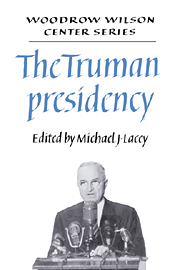Book contents
- Frontmatter
- Contents
- Acknowledgments
- Introduction and summary: The Truman era in retrospect
- 1 The mind and character of Harry S. Truman
- Part I Domestic politics and issues
- Part II Foreign policy and national defense
- 7 The national security state reconsidered: Truman and economic containment, 1945–1950
- 8 The insecurities of victory: the United States and the perception of the Soviet threat after World War II
- 9 Alliance and autonomy: European identity and U.S. foreign policy objectives in the Truman years
- 10 U.S. policy in the Near East: the triumphs and tribulations of the Truman administration
- 11 Toward a post-colonial order: Truman administration policies toward South and Southeast Asia
- 12 Occupied Japan and the cold war in Asia
- 13 The Truman administration and the Korean War
- About the authors
- Index
8 - The insecurities of victory: the United States and the perception of the Soviet threat after World War II
Published online by Cambridge University Press: 06 October 2009
- Frontmatter
- Contents
- Acknowledgments
- Introduction and summary: The Truman era in retrospect
- 1 The mind and character of Harry S. Truman
- Part I Domestic politics and issues
- Part II Foreign policy and national defense
- 7 The national security state reconsidered: Truman and economic containment, 1945–1950
- 8 The insecurities of victory: the United States and the perception of the Soviet threat after World War II
- 9 Alliance and autonomy: European identity and U.S. foreign policy objectives in the Truman years
- 10 U.S. policy in the Near East: the triumphs and tribulations of the Truman administration
- 11 Toward a post-colonial order: Truman administration policies toward South and Southeast Asia
- 12 Occupied Japan and the cold war in Asia
- 13 The Truman administration and the Korean War
- About the authors
- Index
Summary
The cold war, whatever else one might say about it, has been a remarkably durable phenomenon. It has already exceeded in length the Peloponnesian War, the First and Second Punic Wars, the Thirty Years' War, the Wars of the French Revolution and Napoleon, and what Winston Churchill called the second Thirty Years' War that began with an assassin's gunshot at Sarajevo and ended with mushroom clouds over Hiroshima and Nagasaki. Almost half of the twentieth century has now been taken up by one aspect or another of that conflict, a rivalry made all the more striking by the fact that at no point in its long history have its major antagonists actually come to blows.
“De quoi s'agit-il?” Marshal Foch used to ask his subordinates in World War I. “What is it all about?” The passage of time has made this no easy question to answer. The great antagonism between the United States and the Soviet Union has become encrusted, over the years, with successive layers of routine, custom, tradition, myth, and legend. Few of the men who shaped the affairs of nations at its outset are still alive; fewer still are able to recall with any precision what impelled them to act as they did at that time.
- Type
- Chapter
- Information
- The Truman Presidency , pp. 235 - 272Publisher: Cambridge University PressPrint publication year: 1989



